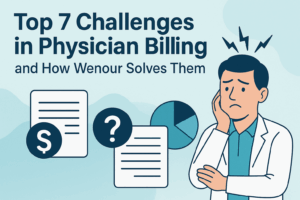Managing medical billing can be a complex and time-consuming task for healthcare providers. Navigating through insurance claims, coding guidelines, and reimbursement processes requires expertise and attention to detail. To ensure a smooth and efficient revenue cycle, it is essential to streamline your medical billing operations. In this blog post, we will provide you with valuable tips to optimize your medical billing processes and improve overall practice efficiency.
1. Invest in Robust Practice Management Software
Utilizing a reliable practice management software can significantly enhance your medical billing operations. Look for a software solution that offers features such as automated claim submission, coding assistance, denial management, and comprehensive reporting capabilities. A user-friendly interface and seamless integration with other systems, such as electronic health records (EHR), can further streamline your workflow and reduce manual errors.
2. Establish Clear Billing Policies and Procedures
Clearly defined billing policies and procedures are essential for ensuring consistency and accuracy in your medical billing processes. Develop a comprehensive billing policy that outlines the required documentation, coding guidelines, and billing timelines. Communicate these policies to your staff, ensuring everyone understands their roles and responsibilities. Regularly review and update your policies to align with industry changes and regulations.
3. Train Your Staff on Coding and Documentation Best Practices
Coding errors and insufficient documentation can lead to claim denials or delays in reimbursement. Invest in ongoing training for your staff to keep them updated on the latest coding guidelines and documentation best practices. Ensure that your coding team is well-versed in the use of appropriate diagnosis and procedure codes. Encourage detailed and accurate documentation by providing templates and guidelines for healthcare professionals.
4. Implement Effective Claims Management Processes
Efficient claims management is crucial for timely reimbursement. Develop a systematic process for claim submission, tracking, and follow-up. Regularly monitor claim status and identify any trends in claim denials or rejections. Promptly address any issues or errors and resubmit claims as necessary. Establish clear communication channels with insurance providers to resolve any payment-related inquiries or disputes.
5. Conduct Regular Audits and Quality Checks
Regular audits of your medical billing processes can help identify areas for improvement and ensure compliance with coding and documentation requirements. Conduct internal audits to review coding accuracy, documentation completeness, and adherence to billing policies. Consider engaging external auditing services to provide an objective assessment of your billing practices. Use these audits as learning opportunities to train your staff and implement necessary changes.
6. Stay Updated with Coding and Regulatory Changes
The medical billing landscape is continually evolving, with changes in coding guidelines and regulatory requirements. Stay updated with these changes by regularly reviewing industry updates, attending training sessions, and participating in professional development opportunities. Keep your staff informed about any changes and provide them with the resources needed to adapt to new coding and billing practices.
7. Outsource Medical Billing Services
If managing your medical billing in-house becomes overwhelming or distracts from patient care, consider outsourcing your medical billing services to a reputable third-party provider. Outsourcing can offer several advantages, including access to billing experts, specialized knowledge of coding and billing regulations, and reduced administrative burdens. Research and select a trusted outsourcing partner who aligns with your practice’s needs and values.
Conclusion
Streamlining your medical billing operations is essential for optimizing your practice’s revenue cycle and overall efficiency. By investing in practice management software, establishing clear billing policies, training your staff, implementing effective claims management processes, conducting regular audits, staying updated with coding and regulatory changes, and considering outsourcing options, you can achieve a more streamlined and successful medical billing workflow.
Remember, the key to successful medical billing lies in accuracy, consistency, and a proactive approach to addressing challenges. By implementing these tips, you can navigate the complexities of medical billing with confidence and focus more on providing quality patient care.
Looking for a prescription to streamline your medical billing woes? Just say ‘Wenour.com‘ and let us handle the rest!
FAQs
Q1. How can practice management software benefit my medical billing processes? A1. Practice management software can automate claim submission, assist with coding, manage denials, and provide comprehensive reporting. It streamlines your workflow, reduces errors, and improves overall efficiency.
Q2. Why is staff training important for medical billing success? A2. Training your staff on coding and documentation best practices ensures accuracy, reduces errors, and minimizes claim denials. It keeps them updated on industry changes and improves overall compliance.
Q3. When should I consider outsourcing my medical billing services? A3. If managing medical billing in-house becomes overwhelming or distracts from patient care, outsourcing can be a viable option. It allows you to leverage specialized expertise and focus on your core competencies.
Q4. How often should I conduct audits of my medical billing processes? A4. Regular audits are recommended to identify areas for improvement and ensure compliance. Conducting internal audits quarterly or biannually can help maintain billing accuracy and identify any potential issues.
Q5. How can I stay updated with coding and regulatory changes? A5. Stay informed by regularly reviewing industry updates, participating in training sessions, and engaging in professional development opportunities. Subscribe to reputable industry publications and join relevant professional associations to access the latest information.







